ChapterThree
Chapter three.认识

Chapter three.认识“嘿少年你还好吗?”少女伸出手在唐晓翼面前晃了晃。
“嗯……好个鬼啊!你到底是谁干嘛莫名其妙找上我?!”唐晓翼终于回过神来,厉声叱问。
“凉沫悠。
”少女嘴角一勾,笑容好似乌云破晓。
“……我没有在问你名字啊怎么会有这种人,真的是我行我素。
”唐晓翼扶额。
“诶一般这个时候不应该伸手介绍自己的么?”凉沫悠疑惑地歪头。
唐晓翼略显无奈地轻叹了口气,伸出手,一字一顿:“唐晓翼,唐家,隶属烈焰神殿。
”凉沫悠脸上终于浮现出名为惊讶的表情:“唐老头子走狗屎运了啊孙子那么漂亮。
”唐晓翼感觉太一陽一穴一狠狠地跳了几下。
——唐战,烈焰神殿殿主,唐家之主,隶属诸神之殿。
“你哪里的,我可没听说过有姓凉这一家的。
”唐晓翼问。
若是有的话,凭这个实力,绝对可以称霸全大一陆。
“你猜!”凉沫悠丝毫不正经。
“猜你个大头鬼我没你那么无聊!”某唐炸一毛一。
“噫棕一毛一好凶啊居然吼人家,连小尘尘都不敢在他自己的地盘上凶本大人你造吗。
”凉沫悠泪眼盈盈,一副受委屈的样子。
——雪丹尘,原风雪神殿殿主,隶属诸神之殿。
“我不想变成傻一逼一请远离我谢谢。
”唐晓翼好不容易从牙缝里挤出几个字。
“诶诶棕一毛一你不要这么冷淡嘛,话说你叫啥?”某悠叽叽喳喳。
“……你是失忆还是智障?”“啧啧唐家人都改不了毒舌这一特点么,你爷爷和老爸也这样,好讨厌。
”唐晓翼转身就走。
“噫棕一毛一你走那么快干嘛?你不把那头狼的什么东西带回去一交一差拿钱?”凉沫悠一顿,迈开大长一腿跟上去。
“你杀的又不是我杀的。
而且要不是你的话说不定我就死了。
”后一句很小声,在喧嚣的冷风中几乎听不见。
“哎?”凉沫悠反应迟钝。
“……没什么,就是……谢了。
”唐晓翼偏过头,十分别扭地说道。
凉沫悠的目光呆滞了一会,下一秒就变成了一个很猥琐的笑容:“哎哟喂你个毒舌棕一毛一竟然会道谢真是百年一遇!哈真不愧本大人活了那么久真的是赚到了~!”“哪里来的滚回哪里去!”“噫棕一毛一不要这样子嘛!来来来我们来谈论一下理想这玩意儿!棕一毛一你的理想是啥看看本大人能不能帮助你实现愿望!”某悠叽叽歪歪。
Chapter 3 Sightseeing

Chapter Three Sightseeing
• 旅行社类词汇
backpacker 背包旅行者 circular tour 环程旅行 return journey / round trip 往返旅行 outward journey 单程旅行 excursion; outing 远足 expedition 探险 independent traveler 旅游散客 holiday resort 度假区 fare 票价 single ticket 单程票
Chapter Three Sightseeing
• 描写旅游景点常用英语词汇 marvelous 引起惊异的, 不可思议的, 非凡的 breathtaking 惊人的 peak 山峰 cliff 悬崖,峭壁 historical 历史性的 arrange 安排 camera 照相机 battery 电池
Chapter Three Sightseeing
• 旅行社类词汇
tourism activities 旅游活动 outbound tourism/travel 出境游 outbound tourist 出境游客 tourism circles 旅游界 tourist destination 旅游目的地 tourist organization 旅游组织 tourist periodical 旅游周刊 tourist spots 旅游点
Chapter Three Sightseeing
• 世界著名游览胜地英文名
Asia 亚洲 Mount Fuji, Japan 日本富士山 Taj Mahal, India 印度泰姬陵 Angkor Wat, Cambodia 柬埔寨吴哥窟 Bali, Indonesia 印度尼西亚巴厘岛 Borobudur, Indonesia 印度尼西亚波罗浮屠 Sentosa, Singapore 新加坡圣淘沙 Babylon, Iraq 伊拉克巴比伦遗迹
Chapter One—Chapter Three

Chapter One—Chapter Three hapter ne—hapter Three【本讲教育信息】一教学内容:Revisin: Fr hapter ne t hapter Three二重难点词汇:1 be een n 喜爱=lie ding stheg: He is een n plaing ftball =He lie plaing ftball2 be siilar t 与……相似,其反义词:be different fr 与……不同eg: T is siilar t ther students3 be respnsible fr 对……负责eg: The an is respnsible fr sales4 fail an exa 考试不及格,与fail有关的词组有:fail t d sth =fail in ding sth 做某事失败ntinue ding sth 继续做某事=g n ding sth6 shut at 对着……喊(不友善的)shut t 对……大喊(没有不友好的)7 stare at 盯着看:l at sth ith interest8 steal sth fr sb 从某人那里偷到什么,容易与它混淆的:rb sb f sth 从某人那里抢什么东西。
rb (v )抢劫--- rbber (n )抢劫犯---rbber (n )抢劫案9 be afraid f sth 害怕……与此相关的词组:be afraid f ding sth 害怕做某事be afraid t d sth 担心做某事这两个词组有时可以相等,但是有时不能替换。
eg: I a afraid f ging ut at night 不能说成I a afraid t g ut at night 10 hpe t d sth 希望做某事hpe+that 从句eg: I hpe u ill rite t e sn注意:绝对不能用hpe sb t d sth希望某人做某事可以说成:expet sb t d sth三重点句子:1 I a abut five feet tall 我大概有五英尺高。
chapter用法
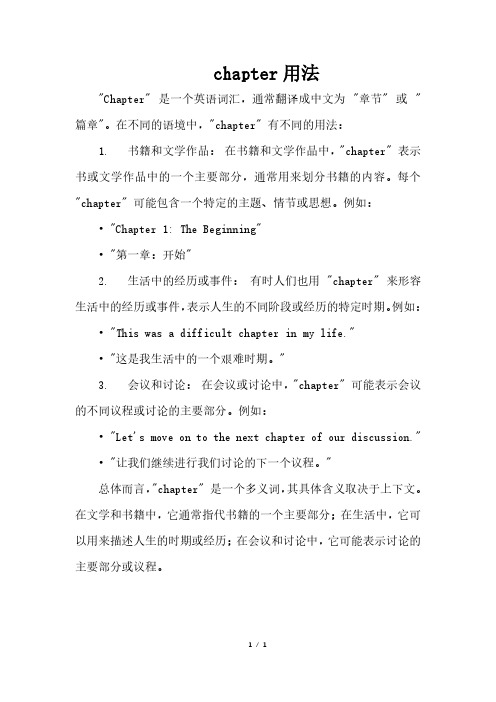
chapter用法"Chapter" 是一个英语词汇,通常翻译成中文为"章节" 或"篇章"。
在不同的语境中,"chapter" 有不同的用法:1. 书籍和文学作品:在书籍和文学作品中,"chapter" 表示书或文学作品中的一个主要部分,通常用来划分书籍的内容。
每个"chapter" 可能包含一个特定的主题、情节或思想。
例如:• "Chapter 1: The Beginning"• "第一章:开始"2. 生活中的经历或事件:有时人们也用 "chapter" 来形容生活中的经历或事件,表示人生的不同阶段或经历的特定时期。
例如:• "This was a difficult chapter in my life."• "这是我生活中的一个艰难时期。
"3. 会议和讨论:在会议或讨论中,"chapter" 可能表示会议的不同议程或讨论的主要部分。
例如:• "Let's move on to the next chapter of our discussion."• "让我们继续进行我们讨论的下一个议程。
"总体而言,"chapter" 是一个多义词,其具体含义取决于上下文。
在文学和书籍中,它通常指代书籍的一个主要部分;在生活中,它可以用来描述人生的时期或经历;在会议和讨论中,它可能表示讨论的主要部分或议程。
1/ 1。
英汉汉英翻译实训教程Chapter Three- Idiom Translation

Idiom Translation
英汉汉英翻译实训教程
Chapter Three
Translate another group of sentences to check your progress.
1.They offered me a good job at that company but I hear that the boss is as hard as nails: one little mistake and you're out on the street the next day looking for a new job。 [译文]:他们向我提供那家公司的一个很好的职位,但是我听说他们的老板是个 很难相处的人:只要你犯一个小错,他马上把你一脚踢出公司大门,让你另谋 生路。
Idiom Translation
英汉汉英翻译实训教程
Listen to Doctor Translator
Chapter Three
1. The crafty enemy was ready to launch an attack while holding out the olive branch.
[译文]:那个年轻人对警察说他与这宗盗窃案无关,但警察看了他的汽车行李箱, 将其人赃并获。
[点评]:“caught red-handed ”原指手上沾满鲜血的杀人犯被逮个现行。在例句 中
译为“人赃并获”,也指犯有任何罪行者当场被捉。
4. Better get a hair cut before you go to that job interview tomorrow. You want to put a best foot forward because there are twenty other people after the same job.
Chapter 3对外直接投资理论

内部化理论(一) (Internalization Theory)
理论背景:Buckley&Casson,1976 理论建立基础:中间产品市场不完全 理论主要内容:要克服市场的不完全所造成 的问题,最好的办法就是实行市场内部化, 即通过直接投资建立多家子公司,把市场建 立在公司内部,以内部市场取代外部市场, 通过公司内部子公司之间的贸易来协调国际 分工,从而保证企业最佳的经济效益,当这 种内部市场的范围超出he Eclectic Theory of International Production) 理论认为:企业对外直接投资的产生是 企业优势、内部化优势和区位优势三大 因素综合作用的结果。用公式表示为: 国际直接投资 =所有权优势(O)+内部化优 势(I)+区位优势(L)
技术地方化理论(二)
理论评价:同威尔斯的小规模技术理论 相比,拉奥的技术地方化理论对发展中 国家对外投资的解释更前进了一步。威 尔斯对发展中国家跨国公司的解释,实 际上是一种技术被动论;而拉奥则更强 调企业技术引进的再生过程,即发展中 国家跨国公司不是在技术变动过程中进 行简单模仿和复制,而同样具有主动性 技术创新,正是这种创新活动给跨国公 司带来竞争优势。
解释了3W问题
企业优势(Ownership Advantage) What ?企业在国外市场进行生产经营活动,必然承担额外 的费用和风险。所以必须拥有当地企业所不具备的优 势。 内部化优势(Internalization Advantage) Why?企业为了避免市场不完全带来的影响而把企业的优 势保持在企业内部,从而实现企业或公司的全球战略。 区位优势(Location Advantage) Where?不同国家和地区在诸多方面存在差异,投资不同 的地区会带来不同的效果,企业只有投资到能产生区 位优势的地区才能产生好的收益。
八年级英语上册ChapterOne—ChapterThree语法重难点复习牛试题
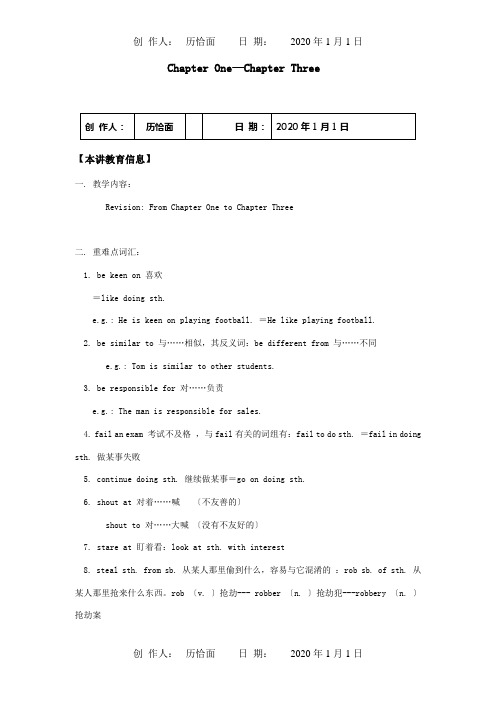
Chapter One—Chapter Three【本讲教育信息】一. 教学内容:Revision: From Chapter One to Chapter Three二. 重难点词汇:1. be keen on 喜欢=like doing sth.e.g.: He is keen on playing football. =He like playing football.2. be similar to 与……相似,其反义词:be different from 与……不同e.g.: Tom is similar to other students.3. be responsible for 对……负责e.g.: The man is responsible for sales.4. fail an exam 考试不及格,与fail有关的词组有:fail to do sth. =fail in doing sth. 做某事失败5. continue doing sth. 继续做某事=go on doing sth.6. shout at 对着……喊〔不友善的〕shout to 对……大喊〔没有不友好的〕7. stare at 盯着看:look at sth. with interest8. steal sth. from sb. 从某人那里偷到什么,容易与它混淆的:rob sb. of sth. 从某人那里抢来什么东西。
rob 〔v. 〕抢劫--- robber 〔n. 〕抢劫犯---robbery 〔n. 〕抢劫案9. be afraid of sth. 害怕……与此相关的词组:be afraid of doing sth. 害怕做某事be afraid to do sth. 担忧做某事这两个词组有时可以相等,但是有时不能交换。
e.g.: I am afraid of going out at night. 不能说成 I am afraid to go out at night.10. hope to do sth. 希望做某事hope+that 从句 e.g.: I hope you will write to me soon.注意:绝对不能用 hope sb. to do sth.希望某人做某事可以说成:expect sb. to do sth.三. 重点句子:1. I am about five feet tall. 我大概有五英尺高。
ChapterThree英汉语言十大差异(word文档良心出品)
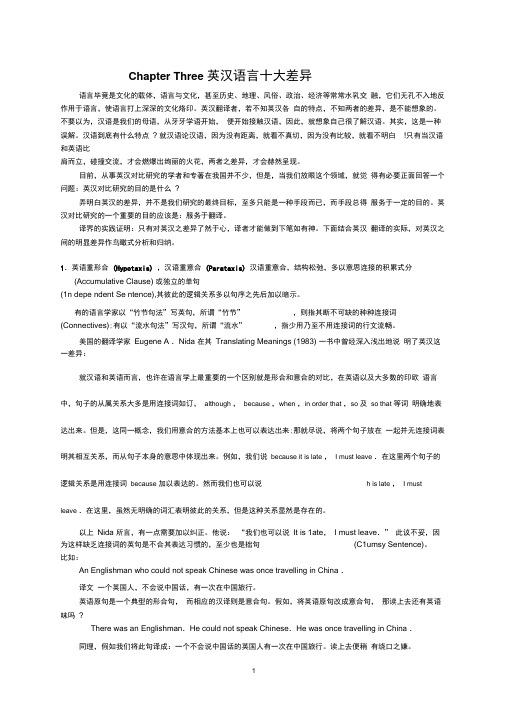
Chapter Three 英汉语言十大差异语言毕竟是文化的载体,语言与文化,甚至历史、地理、风俗、政治、经济等常常水乳交融,它们无孔不入地反作用于语言,使语言打上深深的文化烙印。
英汉翻译者,若不知英汉各自的特点,不知两者的差异,是不能想象的。
不要以为,汉语是我们的母语,从牙牙学语开始,便开始接触汉语,因此,就想象自己很了解汉语。
其实,这是一种误解。
汉语到底有什么特点? 就汉语论汉语,因为没有距离,就看不真切,因为没有比较,就看不明白!只有当汉语和英语比肩而立,碰撞交流,才会燃爆出绚丽的火花,两者之差异,才会赫然呈现。
目前,从事英汉对比研究的学者和专著在我国并不少,但是,当我们放眼这个领域,就觉得有必要正面回答一个问题:英汉对比研究的目的是什么?弄明白英汉的差异,并不是我们研究的最终目标,至多只能是一种手段而已,而手段总得服务于一定的目的。
英汉对比研究的一个重要的目的应该是:服务于翻译。
译界的实践证明:只有对英汉之差异了然于心,译者才能做到下笔如有神。
下面结合英汉翻译的实际,对英汉之间的明显差异作鸟瞰式分析和归纳。
1.英语重形合(Hypotaxis) ,汉语重意合(Parataxis) 汉语重意合,结构松弛,多以意思连接的积累式分(Accumulative Clause) 或独立的单句(1n depe ndent Se ntence),其彼此的逻辑关系多以句序之先后加以暗示。
有的语言学家以“竹节句法”写英句,所谓“竹节”,则指其断不可缺的种种连接词(Connectives);有以“流水句法”写汉句,所谓“流水”,指少用乃至不用连接词的行文流畅。
美国的翻译学家Eugene A .Nida 在其Translating Meanings (1983) 一书中曾经深入浅出地说明了英汉这一差异:就汉语和英语而言,也许在语言学上最重要的一个区别就是形合和意合的对比,在英语以及大多数的印欧语言中,句子的从属关系大多是用连接词如订,although ,because ,when ,in order that ,so 及so that 等词明确地表达出来。
翻译常用方法,2010.11,Chapter 3,

2) For the international community, the most striking consequence of these changes is that China has grown rapidly to be the world’s sixth largest economy, and is set to grow further. 对国际社会来说,这些变化带来的最引人注 目的结果是中国已跃居为世界第六经济大国, 而且今后注定进一步发展。
.
❖ Free translation, also known as sense-forsense translation, emphasizes transfer of the meaning or “spirit” of a source text over accurate reproduction of the original wording. The purpose of sense-for-sense translation is to accommodate the needs of the target language reader by producing a text which conforms to the linguistic and textual norms of the target language and culture and which does not therefore sound “foreign” (Shuttleworth & Cowie 1997: 151).
.
e.g. 1) The rewards for the Chinese people are clear, most visibly in the dynamism and prosperity of Beijing and the coastal cities. 中国人民获得的实惠显而易见,北京和 沿海城市的勃勃生机和繁荣兴旺就是最 明显的见证。
3.chapter three
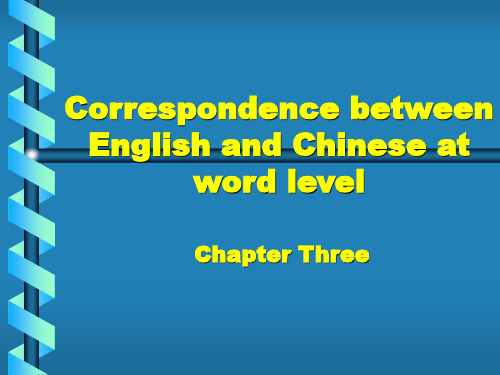
Equivalents interwoven with one another
• Say ( 说 ) , speak ( 讲 ) , talk ( 谈 ) , tell (诉) • He speaks English. 说,讲 English. • He is telling a lie. 说 lie. • He says he is busy. 说,告诉 busy. • I’m unable to express myself clearly. clearly. 说不清 • It must not be mentioned. 这可说不 mentioned. 得 • Be reasonable! 别胡说八道
One word with multiple equivalents of the same meaning
• • • • • • • The typical examples: wife: 妻子,爱人,老婆,媳妇,内人…… 妻子,爱人,老婆,媳妇,内人…… tomato: 西红柿,番茄…… 西红柿,番茄…… potato: 马铃薯,洋芋,土豆,山药蛋…… 马铃薯,洋芋,土豆,山药蛋……
II. Methods of Discriminating the Original Meaning of an English Word
• 1. Judging from the word formation • 2. Judging from the context and collocation • 3. Judging from the referential context • 4.Judging from different branches 4.Judging of learning and specialties
Chapter Three

@
•
J _________________ W built PCs in gar. &
• 1976 W& J started Apple Comp.
• 1977 Apple →success
•
_____________ mass prod PC 1st
•
Jobs 25= millionaire
SECOND LISTENING
PC b. & Steve Jobs
• 1955 Jobs_________ in CA—Silicon V.
b.
• 1969 J met S. Wozniak—built elec equip
• 1975 Woz. Designed 1st _________ PC
•
J. good______________buS
device
• 8. Three years later, Jobs_____ the iPad onto the market. released
Vocabulary Preview
• Match the words with their definitions.
• __g___ 1.equipment
animated device equipment founded mass profitable released strategy
• 1. Jobs’ friend Stephen Wozniak liked to design and build his own electronic__e_q__u_ip_m. ent
• Use your notes to create an oral summary of the lecture .
Chapter 3 nouns 语法名词

Nouns of the same forms III
cattle, folk, people, police, youth, militia, poultry
The cattle ____(be) are grazing in the field. The police ______ have (have) not made any arrests. a cow, a person, a policeman, a young man The Chinese are a hard-working people. Ireland was inhabited by two peoples.
• • • • • •
Jim is friends with Tom. Do you want to change places with me? He was all smiles. He took great pains to study well. He refused to take sides in the debate. Mary had words with her boss the other day.
means
It is an effective means of communication. All possible means have been tried.
works
There has been an accident at this works. There are some iron works near the river.
Uncountable Noun
• • • • • • 一件家具 a piece (an article) of furniture 一块方糖 a lump of sugar 一阵笑声 a burst of laughter 一阵怒火 a fit of anger 一盘棋 a game of chess 一道闪电 a flash of lightning
八年级英语chapter3语法重难点讲解3

八年级英语chapter3语法重难点讲解3Chapter Three【本讲教育信息】一. 教学内容:Chapter Three: Dealing with trouble: reading[学习过程]一、重点句子:1. Today my father and I were waiting for the ferry .今天我爸爸和我正在等渡轮。
在此句中所用的时态是过去进行时,这一时态的基本结构是was/were+ v.-ing 形式。
它与一般过去时态不同。
一般过去时态用于陈述过去的事实, 而过去进行时态用于描述过去某个时间里正在发生的动作,句中常有具体的表示过去的时间点或时间段。
I was watching the World Cup Final at 7 o’clock yesterday evening.昨晚7点,我正在看世界杯决赛。
He watched the World Cup Final yesterday evening. 昨晚他看了世界杯决赛。
这一时态用于描述过去某一时刻正在发生的动作。
而现在进行时描述的是目前正在发生的动作。
I was having my breakfast then. 那时我正在吃早餐。
I’m having my breakfast now.现在我正在吃早餐。
You were sleeping then. 当时你正在睡觉。
They are sleeping now. 现在他们正在睡觉。
wait for 表示:等候,等待.wait 是一个不及物动词,后接宾语时,必须用短语wait for.Please wait here. He will be back in a minute. 请等在这儿吧。
他一会儿就会回来。
We should wait for help. 我们应该等待帮忙。
Will you wait for me for a while?你等我一会好么?2. This afternoon we heard a big argument. 今天下午我们听见一场大声的争论。
语言学练习-Chapter Three

Chapter ThreeI. Fill in the blanks with the right linguistic concepts1. A __________ is one that cannot constitute a word by itself.2. There are two fields of morphology: the study of __________ and the study of __________.3. Some morphemes like –ish, -ness, -ly, -dis, trans-, un-are never words by themselves but are always parts of words. These affixes are __________ morphemes.4. The different members of a phoneme, sounds which are phonetically different but do not make one word different from another in meaning, are __________II. Determine if each of the following statements is true of false1.The sound [z] is shared by “boys”and “moves”as a commonmorpheme.III. Give brief definitions of the following terms1.morpheme2. Functional morpheme3. bound morpheme4. morphologyKeys:I. Fill in the blanks with the right linguistic concepts1. bound2. inflectional, lexical / derivational3. bound4. allophonesII. Determine if each of the following statements is true of false1. F (The sound [z] is not morpheme. “s”is shared by “boys”and “moves” as a common morpheme.III. Give brief definitions of the following terms1. Morpheme is the smallest unit of language in terms of relationship between expression and content, a unit that cannot be divided into further smaller units without destroying or drastically altering the meaning, whether it is lexical or grammatical. For example, in “boys”, there are two morphemes: “boy”and “-s”; in “international”, there are three morphemes: “inter-“, “nation” and “-al”.2. Functional morpheme: This is a subtype of free morphemes,which one consists largely of the functional words in language such as conjunctions, prepositions, articles and pronouns, for example, “and, about, when, on, near, the” and so on.3. Bound morphemes refer to those morphemes that can not occur alone and must appear with at least another morpheme. For example, in the word “careless”, “-less”is a bound morpheme since it could not occur by itself as a word.4. Morphology:the study of morphemes and their different forms (allomorphs), and the way they combine in word formation. For example, the English word unfriendly is formed from friend, the adjective-forming suffix –ly and the negative prefix un-.。
翻译常用方法,2019.11,Chapter 3,精品文档
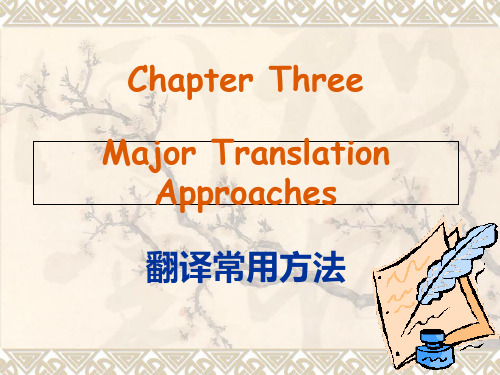
2) For the international community, the most striking consequence of these changes is that China has grown rapidly to be the world’s sixth largest economy, and is set to grow further.
As for free translation, the translator is never really “free”, but is always restricted by the
source text. Actually the purpose of
any and all translation is to convey
Chapter Three
Major Translation Approaches
翻译常用方法
So when the original coincides or almost tallies with the target language in the sequence of vocabulary, in grammatical structure and rhetorical device, literal translation can be used.
ray of hope His life hangs on a thread.
an eye for an eye, a tooth for a tooth 以眼还眼,以牙还牙
ray of hope 希望之光
His life hangs on a thread. 他的生命悬于一线。
Cast a shadow over 纸老虎 一国两制strives to reproduce both the ideological content and style of the entire literary work and retain as much as possible the figures of speech and sentence structures of patterns.
英语专业语言学chapter three

Bilabial 双唇音 e.g. [p], [m]. Labio-dental 唇齿音 e.g. [f]. Dental 齿音 e.g.[ð] Alveolar 齿龈音 e.g. [t] Palatal 腭音 e.g..[j]. Palato-alveolar 腭龈音 e.g. [ʃ] Velar 软腭音 e.g. [k]. Glottal 声门音,喉音 e.g. [h] Retroflex 卷舌音. Uvular, 小舌音 Pharyngeal 咽音
Classes of Vowels
Vowels are classified with several criteria such as tongue positions, mouth opening, lip shapes, sound length, and muscular tension. According to the height of tongue, they are high, mid, and low vowels; according to the raised part of tongue, they are front, central, and back vowels; according to the opening of the mouth, they are close, semi-close, semiopen, and open vowels; according to the lip shapes, they are rounded and unrounded vowels; according to the sound length of they are long vowels and short vowels; according to the muscular tension, they are tense and lax vowels. Cardinal vowels are a set of fixed vowel qualities used for the description of other vowels that actually occur in any language.
Chapter 3 Unit 1-Liaison Interpreting

B: Excellent! What about visits to Shanghai Free Trade Zone? A: 根据您的要求,我们把您访问中国(上海)自由贸易试验区的时间安排在后
天上午。届时您可以有充足的时间了解洽谈。而您的回城飞机正好在后天晚上, 到时候我们直接把您送到机场。
9
© ZHU Peifen, ZHOU Yuan
INTERPRETING PRACTICE
场景一:机场迎宾 Greetings at the Airport A: 先生,请问您是从西雅图来的琼斯先生吗?
B: Yes, I am David Jones from Seattle, U.S.A.. If I'm not mistaken, you must be Miss Zhou from Datong Group.
BUSINESS ENGLISH INTERPRETING 商务英语口译
朱佩芬 周媛
CHAPTER THREE
UNIT ONE
Liaison Interpreting
© ZHU Peifen, ZHOU Yuan
LEARNING OBJECTIVES
After learning this chapter, students should be able to: know different categories of liaison interpreting know the requirements for interpreters be familiar with key words and phrases do liaison interpreting
记得要忘记_五年级作文
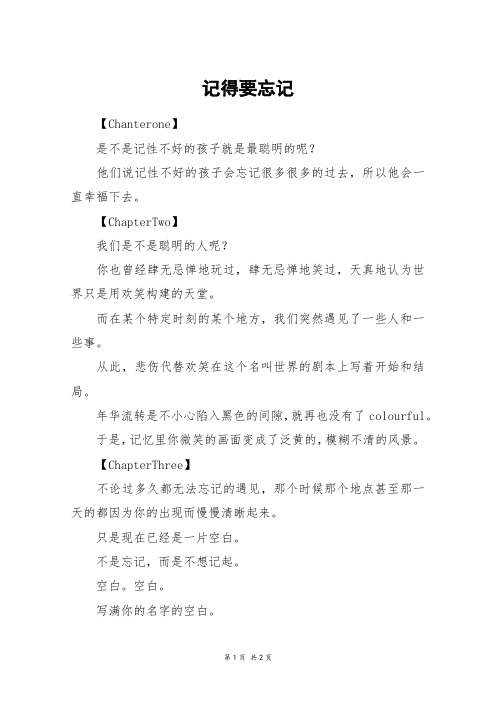
记得要忘记
【Chanterone】
是不是记性不好的孩子就是最聪明的呢?
他们说记性不好的孩子会忘记很多很多的过去,所以他会一直幸福下去。
【ChapterTwo】
我们是不是聪明的人呢?
你也曾经肆无忌惮地玩过,肆无忌惮地笑过,天真地认为世界只是用欢笑构建的天堂。
而在某个特定时刻的某个地方,我们突然遇见了一些人和一些事。
从此,悲伤代替欢笑在这个名叫世界的剧本上写着开始和结局。
年华流转是不小心陷入黑色的间隙,就再也没有了colourful。
于是,记忆里你微笑的画面变成了泛黄的,模糊不清的风景。
【ChapterThree】
不论过多久都无法忘记的遇见,那个时候那个地点甚至那一天的都因为你的出现而慢慢清晰起来。
只是现在已经是一片空白。
不是忘记,而是不想记起。
空白。
空白。
写满你的名字的空白。
【ChapterFour】
思念和困苦开始无边际地泛滥。
试图淡忘,却发现一切只是徒劳。
我开始轻声祈祷,让时间永远停止在你出现的每一个瞬间。
【ChapterFive】
开始不断地提醒自己。
记得要忘记。
或许有一天,我真的可以很释怀地对着大家说,曾经有一个我爱得很深很深的女孩忽然消失在我的世界里,这个人间是不是很残忍。
记忆忽然褪色。
【ChapterForever】
再也无法遇见第二个寂寞的人的寂寞世界。
我独自孤独,独自悲伤,独自迷失在暗夜里。
忽然遇见你。
“呃...你在啊!今天没课?”
“嗯,是的。
”你愕然,“不过...你是谁?”。
- 1、下载文档前请自行甄别文档内容的完整性,平台不提供额外的编辑、内容补充、找答案等附加服务。
- 2、"仅部分预览"的文档,不可在线预览部分如存在完整性等问题,可反馈申请退款(可完整预览的文档不适用该条件!)。
- 3、如文档侵犯您的权益,请联系客服反馈,我们会尽快为您处理(人工客服工作时间:9:00-18:30)。
Chapter ThreeThe Horror, the Horror:The Unsettling Effect of the Fairy TaleShe [Carter] is fascinated […] by the blurring of gender boundaries;by adolescence, that brief period when the subject is not quite a child,but also not yet adult; with the period of suspension betweendeparture and destination which constitutes a journey […].--Sarah Gamble’s Introduction of Angela Carter:Writing from the Front LineThe Magic Toyshop is a story of Bildungsroman. The protagonist, Melanie, is a fifteenth-year-old girl whose family is fairly rich. She and her brother Jonathon and sister Victoria live happily without worry. Nevertheless, their parents die in an air crash. The three of them come to their Uncle Philip Flower, the only relative they have, for shelter and protection. It turns out that their uncle is a cruel and violent toymaker, trying to turn these three children into three “flowers” as he expects. Melanie feels herself isolated in this castle of the Bluebeard, for her brother only cares about making the models of ship and her sister only cares about eating. She lives under the gloomy atmosphere of the house, working day and night. “How could this be?” she doubts from time to time. What she is looking for is a delicate future with her prince of charming, but in this house, there is only a dirty Finn. The whole lot of events happens to her like a stormy wave. She even has to play with puppets on thestage. What will become of her?I. The Magic Toyshop as Fairy TaleThe Magic Toyshop is defined by her as a fairy tale in an interview with John Haffenden. Angela Carter shows her interest in fairy tales throughout her academic career. She does not only write novels which are embedded in the elements and motifs of fairy tale and the fantastic, but has also edited several anthologies of fairy tales including the two volumes of The Virago Book of Fairy Tales, Wayward girls & wicked women, Sleeping Beauty and Other Favorite Fairy Tales, and so on. In the interview, she conveys her tendency toward regarding European literature as a kind of folklore and writing herself within the tradition. Carter places a lot of Irish folklores in The Magic Toyshop, which is deemed by Roby Kinley as an “obsessive creation of a fantasy world” with fairy tale motifs (42). However, Carter’s fantasy does not present a world of promise and hope but often a world of threat and danger, within which the protagonist fights to find a way out.According to Alan Dundes in the introduction to the second edition of Vladimir Propp’s Morphology of the Folktale, fairy tale is a “model of fantasy” (xiii). Merja Makinen also considers fantasy to be one of the main conventions of the fairy tale, and since fantasy profoundly disturbs and subverts the reader’s cognition, the fairy tale has the “potentially transgressive disposition” and the “ability to unsettle and disturb the traditionally male reader” (Makinen 59). Carter creates her model particularly within this fairy tale of fantasy.Propp manifests that in the genre of fairy tale, a person of older generation orparents depart from home, leaving the younger generation by themselves, and a more “intensified form of absentation is presented by the death of parents” (26). Because the younger generation is left at home without restraint, the protagonist consequently violates some prohibition: “The interdiction is violated” (Propp 27). In The Magic Toyshop, from the beginning the parents are absent because the father, a successful writer, has a lecture tour in American, leaving the children at home with the housekeeper, Mrs Rundle, who pays little attention to what the children are doing except loading the children with “bread pudding plain and fancy, with or without currants or sultanas or both” (Carter 3). Therefore, the summer vacation of the fifteenth-year-old protagonist, Melanie, passes within her bedroom, fantasizing her future of marrying a price charming or at least having sex.One night when Melanie cannot sleep, she sets out an adventure into her parents’ bedroom, imagining how her parents make love with clothes on: her father always wears the “hairy tweed jacket with leather elbow-patches” with his pipe in the breast pocket, and her mother always wears her “black, going-to-town suit” (Carter 10). Then, Melanie surveys her parents’ wedding photograph, in which her mother’s wedding dress is so extravagant as if she is “in a pyrotechnic display of satin and lace […] as for a medieval banquet” (11). Holding a banquet of white roses, her mother looks so “soppy and ecstatic and young and touching” that Melanie regards this moment as the most beautiful time of her mother’s life (11). Finally, Melanie puts on her mother’s perfume of Chanel, and all of a sudden she is stunned and confused by the scent that she thinks herself turning into her mother: “[…] smelled so like her mother that she glanced at herself in the mirror to make sure she was still Melanie”(14). Touched by the romance atmosphere of the photograph, Melanie tries on her mother’s wedding dress with the sense of guilt and goes into the garden. Afterwards she finds that she is locked outside and forced to climb the apple tree near her bedroom window to get back. Because the wedding dress is ruined and the wreath is left on the tree during the process, Melanie feels shame, foolish, “chastened and humiliated” (23). Therefore, when a telegram is sent to her home, she immediately assumes that it is about the death of her parents, thinking the cause is that she wears and ruins the dress: “She [Melanie] met herself in the mirror, white face, black hair. The girl who killed her mother” (24). Although her mother does not forbid her to wear the dress in the novel, Melanie does have sense of shame and guilt about the damage. In this sense, Melanie fits the protagonist in the model of fairy tale in Propp’s definition, who violates the prohibition in the established order.Melanie’s parents died in the air crash, so the function of the absence of the parents in the fairy tale is enhanced. The father does not leave any savings, believing that he can always earn more. Therefore, the three children are without economic support and are sent to their Uncle Philip, the brother of their mother. After the violation of the interdiction or prohibition, the protagonist has to start an adventure or journey, and according to Propp, there are two kinds of heroes, seeker-heroes and victim-heroes: the first has a pursuit or destination, while the second begins a “journey without searches, on which various adventures await the hero” (39). Melanie belongs to the second, who is thrust into the unknown future with no sense of guarantee. Melanie feels herself, her brother, and sister as the “forlorn passengers from a wrecked ship […] at the choppy sea to which they must commit themselves”(Carter 30). Despite the feeling of helplessness, she reckons that she has to take the responsibility for the situation and be a “little mother” (31). Melanie shows her strength by bravely taking the responsibility. She binds her hair in the manner of a squaw so tightly that it hurts, but she does so for “penance” (The Magic Toyshop 28). Consequently, in the fairy tale there has to be villains who use their power to oppress the others in order to benefit. According to Zipes, the villains are “those who use words intentionally to exploit, control, transfix, incarcerate, and destroy for their benefit” (When Dreams Came True 6). They are selfish and egotistic that others’ will is not a concern for him, and due to their social, institutional, or economic power, the enforcement of the commands is difficult for the victims to subvert and fight back. Philip Flower is the villain in The Magic Toyshop, who does not even laugh on his sister’s wedding day. Later he sends a malicious jack-in-the-box in which contains a horrid cartoon of Melanie’s face, deliberately frightening the little girl. His house, gloomily set at Southern London, is his governed realm in which everyone has to obey his order. His wife, Margaret, is the poorest victim in the Flower’s family. Since the day she is married, Margaret loses the ability to speak, “like a curse. Her silence” (Carter 37). In front of Philip’s “stifling” authority, Aunt Margaret is like a bended flower, even afraid of looking at him (73). The mental abuse from her husband causes the malnutrition so that her shoulders are like one pair of bony wings. Just like any other doll made by Philip, Margaret is oppressed to become one of the “Dutch-doll” with arms of “hinged sticks” and “cool, dry and papery” lips (48-9). Everyday Margaret cooks for the household and sews the clothing for the dolls with hands as much and as fast as she can.When it comes to Sunday afternoon, she changes into her best dress, “an annihilation of any possibility of prettiness,” which is oversized, horrid, and gloomily grey (111). The dress goes with a silver necklace made by Philip as a wedding gift, but the wedding gift is meant for torture than pleasure, which buckles so tightly around Margaret’s neck that she can not even turn her head. Because the necklace is almost up to her chin, Margaret has to hold up her head “high and haughty as the Queen of Assyria” (112-13) but there is no pride in her eyes but sorrow and anxiousness: “Il suffrir pour tre belle”1(113). It is Philip’s purpose to cause his wife much pain so that he can be satisfied with his overruling power over the family, for the collar is “primitive and barbaric; the mastiff of a prince of medieval Persia might have worn it for going out hawing in a miniature” (113). Margaret bears a resemblance to a mastiff, because they are regarded as property and subordinate to their masters who can control their fates. While watching his wife eat with great difficulty, Philip shows “expressionless satisfaction, apparently deriving a certain pleasure from her discomfort, or even finding that the sight of it improved his appetite” (113). Philip treats his wife as a puppet for in one of his puppet show, Philip decorates Mary, Queen of Scots, with the similar collar.Philip enjoys manipulating the members of the family, treating them like they were puppets and dolls. Under the house, the basement is the place where Philip works on puppets and dolls for sales or for his pleasure. He does delicate and ingenious adornment such as “The Rocky Road to Dublin” which are two dancing monkeys that play violin and flute (65), and “Surprise Rose Bowl” which is a white 1“Il suffrir pour tre belle”: One suffers for being beautiful.rose with a bud that contains a circling shepherdess doll. Beside of those saleable dolls, what Philip really likes is to create the puppets for the performance of the puppet show, his “heart’s darling,” in which he is in total control (67). What he makes is not meant to bring other pleasure, and the children in the house are not allowed to play it either. Therefore, Finn warns Melanie not to wear trousers in the house and not to speak except when Philip asks her questions the first day she arrives at the house, because Philip likes “silent women” (63).Later Finn shows Melanie the toys in the basement, and although toys are originally made for pleasure and fun, Melanie does not feel happy to see her uncle’s work, especially when seeing that a live-sized lady puppet lies with face down on the stage as if somebody gets “tired of her in the middle of playing with her” and forsakes it arbitrarily (67). From the scenery, Melanie faintly sees her future: “The crazy world whirled about her, men and women dwarfed by toys and puppets, where even the birds were mechanical […], and the doll was herself” (68). In the toyshop, she feels herself being reduced to an object, a toy, or a puppet, manipulated by Uncle Philip. Day after day, Melanie cannot sense her own subjectivity. Compared to the red-haired Jowleses, she turns into a grey shadow: “they [the Jowleses] were red and had substance and she, Melanie, was forever grey, a shadow,” because since the day she wears her mother’s wedding dress, Melanie believes that she is doomed (77). Her presage is right. Melanie is doomed because from that day on, she is forced to enter female adulthood dominated by men. Not treating the members of the family as people but dolls, Uncle Philip eventually decides to put Melanie into his puppet show.The stains of fairy tale are all over the text. Firstly, the violent and highhandedPhilip owns the power to suppress people in the shop, which Melanie originally regards as “the Castle of Corbenic” but eventually discovers as the castle of Bluebeard (37). There seems to be a force or spell set upon the house. One day Melanie is left alone in the kitchen, cleaning all the dishes and finding a chopped hand with a great amount of blood in a drawer. “Bluebeard was here,” Melanie panics and faints. The hand, “soft-looking, plump little hand with pretty, tapering fingers” with a silver ring, belongs to a young girl (118). However, later Francie inspects the drawer and finds nothing. The illusional hand, signifying that the romantic part of her imagination is killed, reveals the fear in Melanie’s unconsciousness. The Bluebeard is Uncle Philip, who kills any possibility of the romantic prospect in the future.Secondly, when Melanie, her brother and sister are sent to London, they take a long-distance taxi with Francie and Finn. After a long ride, Melanie can not help asking about when they will arrive, but Finn’s answer is twice, “Sill farther (37),” which is the intertexuality of the typical beginning of a fairy tale, “far far away.” At sunset, Melanie indicates that it is going to get dark, and as if she speaks the “secret sequence of words” which can “lead her safe over the sword-edge bridge” into the castle (37). Thirdly, the beginning of chapter three begins with “Now, who has planted this thick hedge of crimson roses in all this dark, green, luxuriant foliage with, oh, what cruel thorns?” (53) The allusion is to the story of the sleeping beauty, “la belle au bois dormante” (53). It is the first morning at the Flowers. Melanie wakes up to notice the thorns of roses on the wall paper. When the children finally settle down, every Monday night Aunt Margaret bathes Victoria.II. Psychoanalytical Analysis of Melanie’s Subjectivity within the Social Systemof the Patriarchal DominationSarah Gamble expresses that subjectivity is “one of the major strands” in Carter’s novels (7). The fantastic is a perfect means to analyze the issue of subjectivity, since it is a genre deeply concerned with the realm of desire/lack and unconsciousness. According to Jackson, the fantastic is a means to reveal unconsciousness, and thus itis specifically “open to psychoanalytic readings” (6).2One of the prominent critics on Carter, Paulina Palmer, also states that Carter takes a “psychoanalytic approach to gender” in The Magic Toyshop (75). The psychoanalytic analysis is particularly fit for shedding light on the bildungsroman of Melanie. At the beginning of the novel, Melanie, fifteenth years old, enters the oedipal stage and starts to build her ideal ego. In front of the mirror, she poses as the female characters in paintings:She also posed in attitudes, holding things. Pre-Raphaelite, she combed out her long, black hair to stream straight down from a centreparting and thoughtfully regarded herself as she held a tiger-lily from thegarden under her chin, her knees pressed close together. A la ToulouseLautrec3, she dragged her hair sluttishly across her face and sat down inchair with her legs apart and a bowl of water and a towel at her feet. Shealways particularly wicked when she posed for Lautrec, although she2Jackson relates psychoanalytic study to the core of fantasy, claiming that the omission of psychoanalytic analysis to be one of the insufficiencies of Todorov’s study of the fantastic. Jackson’s criticism of Todorov’s study has been mentioned in previous chapter.3Henri de Toulouse-Lautrec (1864-1901) spent his life in the Montmartre section of Paris, the centerof the cabaret entertainment and bohemian life and painted the Parisian nightlife.made up fantasies in which she lived in his time […] (Carter 1).Since the mirror phase, a baby constructs his subjectivity by identifying itself with what it sees, typically with mother, recognizing that its self and his mother are unified, which Jacques Lacan points out as a misconception: “the nature of symbolic incorporation is misunderstood” (Lacan 246). Later this misrecognition is broken by the realization that actually what his mother desires is the father and not it, and thus the baby feels powerless and castrated, which is called the oedipal stage. Therefore, a boy turns to identify with the powerful father. As for a girl, she needs to become what the father likes: “[…] the girl abandons the mother as a love-object, and focuses her libidinal drives on the father” (Grosz 69). The child imagines what he or she should look like in others’ eyes.Melanie believes she is what she sees in the mirror, imagining herself as the objects of the male desire. She pretends to be the female in the gaze of the male, like Pre-Raphaelite, Toulouse Lautrec, Titian, Renoir, and Cranach.She was too thin for a Titian4or a Renoir but she contrived a pale, smug Cranach5Venus with a bit of net curtain wound round her head andthe necklace of cultured pearls they gave her when she was confirmed ather throat. After she read Lady Chatterley’s Lover,6she secretly picked4Titian (Tiziano Vecellio) (c. 1485-1576), the greatest painter of the Venetian school, was probably a pupil of Bellini, Giovanni.5Cranach, Lucas the Elder (1472-1553), German painter, was particularly good at painting nude women with erotic beauty.6It is worth noticing that there is only one writer among those male artists, D. H. Lawrence, whom Carter is quite strongly opposed to. Carter describes the social regulations and conventions as “social fictions” and “what Blake called the ‘mind-forg’d manacles’” which she is highly conscious of (“Notesforget-me-nots and stuck them in her pubic hair. (2)By turning herself into the images of those erotic women which the male takes for granted, Melanie becomes involved in the symbolic order in which the male dominants the female subjectivity and sexuality. Therefore, she is not satisfied with her slim figure and small breasts. Melanie thinks that as long as she resembles those women, she eventually can get her bridegroom who takes her to honeymoon at exotic places. Getting married is such an important and crucial event in Melanie’s perception: “’Well, I shall grow up. And get married. I hope I get married. Oh, how awful if I don’t get married.’” (The Magic Toyshop 6). Melanie’s subjectivity can only be reassured in a family structure, subordinating under the male’s interpretation of women. Carter expresses her observation in “Notes from the Front Line,” when she notices that there is asense of heightened awareness of the society around me [Carter] in thesummer of 1968, my own questioning of the nature of my reality as awoman. How that social fiction of my ‘femininity’ was created, bymeans outside my control, and palmed off on me as a real thing. (70) This kind of awareness is in deed what Carter focuses on when she writes The Magic Toyshop in 1967. She interrogates the social injustice of which women have no power to shape her identity and subjectivity. This process of “oedipal socialization”from the front line” 70). In brackets she notes her constant perceptions that the “versions of reality” she is offered are “badly wrong,” which takes the “being as a woman for granted:” “I smelled the rat in D.H. Lawrence pretty damn quick” (70). In Carter’s criticism on sexuality and pornography, The Sadeian Woman, she argues that sexuality is “never expressed in a vacuum [….] Sexuality is as much a social fact as it is a human one” (11). Sexuality is constructed as a narrative of social and cultural conventions.demonstrates that “a castrating process that strips a girl of her active impulses, her agency, and indeed her subjectivity, reducing her to the feminine object required by a patriarchal social order” (Wyatt 67). Already sacrificing her subjectivity in the social order, Melanie does not realize that her thinking is controlled by the operation of the patriarchal discourse.After looking at her parents’ wedding photograph, Melanie is touched by the luxury of the dress and the emotions on her mother’s face. The white wedding dress, the symbol of pureness and innocence, is a delicate device to restrict women’s freedom of sensuality. Such a “[s]ymbolic and virtuous white” dress is made to reward women for their virtues of obeying the social rules: “White satin shows every mark, white tulle crumples at the touch of a finger, white roses shower petals at a breath. Virtue is fragile” (The Magic Toyshop 13). The patriarchy sets numerous restrictions for women, and one of which is that women have to keep their virginity until marriage. However, in order to get sexual pleasure before marriage, men seduce and threaten women to violent the restriction. In the women’s magazines borrowed from Mrs Roundle, Melanie is confused by the letters in which women proclaim that “’My boy friend says he will leave me unless I let him love me to the full but I want to be honestly married in white’” (13). The male seduces and threatens women into sex before marriage, and then blames them for not being pure and virtuous. The wedding ceremony is more like a celebration of virginity instead of sincere relationship. Melanie is a girl who desperately wants to fit in the archetype of women made by patriarchal system. Therefore, she inevitably wants to become the perfect image of women in the male’s perception. Gazing into her mother’s dressing-tablemirror, Melanie is startled by the image of her in the white dress: “’And am I as beautiful as that?’ she thought […]” (16). She is intoxicated, “’Look at me!’ she saidto the apple tree […]. ‘Look at me!’ she cried passionately to the pumpkin moon” (16). Although Melanie believes the image in the mirror, which shows her to be the perfect woman, the image is not truly equivalent to what she is.In the moonlight, Melanie has a feeling that she is the “last, the only woman” on earth (17). In other words, she dresses her mother’s wedding dress and becomes her mother, substituting her mother’s place psychologically. Later when she gets the telegram of her parents’ death, Melanie believes that she kills her mother: “’It is my fault,’ […] ‘It is my fault because I wore her dress. If I hadn’t spoiled her dress, everything would be all right” (24). Assuming that she should take the responsibility of her mother’s death, Melanie turns to hate her image in the mirror.[…] She met herself in the mirror, white face, black hair. The girl who killed her mother. She picked up the hairbrush and flung it at her reflectedface. The mirror shattered. Behind the mirror was nothing but the barewood of her wardrobe.She was disappointed; she wanted to see her mirror, still, and the room reflected in the mirror, still, but herself gone, smashed. (25)By smashing her image in the mirror, Melanie hopes that her image can be ruined, and thus her mother can come back from death. Alongside the oncoming great change of her life style, what Melanie imagines to be in front of the mirror paves the way for her victimization.As Richard J. Lane and Philip Tew indicates, Carter’s protagonists arepresented in a “space that is often determined by desire, perversity and sexual abandon in a contest with containment, tradition and self-negation” (194) (emphasis added). Melanie’s willingness to be subordinated to the male gaze reveals the psychoanalytical state of a girl who experiences the oedipal phase. The reminiscence of the primal stage disturbs what is repressed in the reader’s unconsciousness and brings what is hidden beneath into daylight. Melanie’s “sexual abandon” causes the effect of the unsettling on the reader, and her experience of alienation provokes questions about sexual domination and the male creation of femininity (194). Melanie’s abandonment of her sexuality is much less a negation than a protest against the sexual manipulation of patriarchy.A. The House of Dolls: Flattened by the Pressure of Patriarchal DominancePaulina Palmer remarks that around early 1970s radical feminists focus on the topic of family, because in the realm of family, there exists “women’s oppression and the dialectic of sex” (71). Family is the first place “where the Law of the Father is inculcated and the positions of masculinity and femininity learnt; and the arena where acts of male violence, including battery, rape and incest, are perpetrated” (Palmer 71). The Magic Toyshop is a novel which concentrates on the issue of patriarchal domination within the household. Since Melanie, Jonathon, and Victoria are sent to their Uncle Philip at southern London, they enter the realm of symbolic order, completely dominated by the law of father. Philip represents the symbolic order in a patriarchal society. Melanie gradually loses her subjectivity and feels herself becoming gray and unsubstantial, compared with the red-hair Jowleses: “Yet how didthey manage to stay red and substantial (or, in Aunt Margaret’s case, intermittently substantial) when they lived under the weight of Uncle Philip, the Beast of the Apocalypse?”7(The Magic Toyshop 77) Melanie is extremely afraid of Uncle Philip’s authority.She saw her uncle only at mealtimes but his presence, brooding and oppressive, filled the house. She walked warily as if his colourlesseyes were judging and assessing her all the time. She tremblesinvoluntarily when she saw him. […] He seems of a different texture andsubstance from her gentle and ineffectual mother; he was hewn or cut outof thunder itself. She sensed his irrational violence in the air about him.Sometimes he fell in a landslide on Finn, clouting him round the headover the dinner table when Finn’s insouciant insolence went too far. (TheMagic Toyshop 92) (emphases added)Under the pressure of Philip’s wrath, Melanie reduces her personality and subjectivity to fitting in with the silent and obedient character/role set by him. Although Melanie seems to have quite adjusted to the role on the surface, her subjectivity is greatly maimed in the process of entering the realm of patriarchy.While working, Melanie frequently feels numb and senseless as if she has already been turned into a doll, like the five-feet-high puppet abandoned by Philip on the stage when satiated: “She was a wind-up putting-away doll, clicking through its7The Beast of the Apocalypse: Revelation 13 and the book of Daniel indicate that there are several disordered powers in the apocalyptic world. The beast(s) rises from the sea, which hints that the beast originates from the turmoil of people, and the wind is a hint of the occurrence of war.programmed movements. Uncle Philip might have made her over, already. She was without volition of her own” (The Magic Toyshop 76). Indeed, Philip does not allow anybody in the shop to have his or her will, and his designs and plans have to be obeyed. Uncle Philip’s complacency comes from what he designs and makes, those dolls, puppets, toys, and even people in the shop. Philip apprentices Jonathon to be a toymaker just like him, pleased with Jonathon’s obedience. As for Jonathon, he is fully content as long as he can make model ships, living in his own world without noticing that those events happen around him. When being asked by Melanie whether he is happy or not, Jonathon reacts as if “to him her question was boring and irrelevant” (82). His “frightening tractability” eventually makes him one of Philip’s puppets, an apprentice of his authority (82).Therefore, it is understandable that Philip highly values his puppet show, because it is the only occasion that can greatly satisfy his desire of full control. In the basement, the image on the poster can efficiently explain the essence of the puppet show and the condition of the members of the family: Uncle Philip, “a great figure by virtue of the moustache and wing collar, holding the ball of the world in his hand,” and the words of “’GRAND PERFORMANCE—FLOWER’S PUPPET MICROCOSM’” (The Magic Toyshop 126). Imagining himself as a god, Philip believes that he has the power to control and run the world. Certainly, in his toyshop, a puppet show is performed by everyone who has to obey his rules and commands. Melanie is appointed by him to play Leda: “’Humans can act with my puppets,’ said Uncle Philip. ‘That’s it. That’ll be a novelty. Puppets and people. I’ll use the girl.’ He swung round and jabbed his forefinger at Melanie. ‘I’ll use you, miss!’” (132).。
